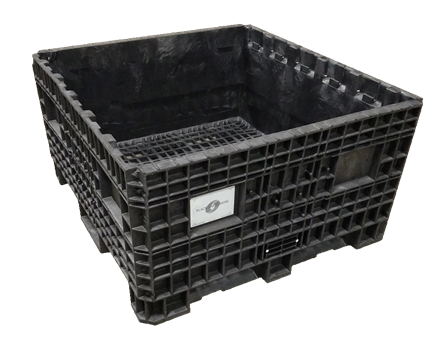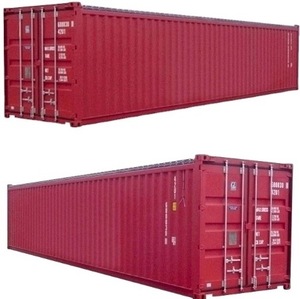The Ultimate Overview to Picking the Right Bulk Containers for Your Company Demands
Selecting the suitable mass containers is crucial for any type of business that depends on efficient logistics. Numerous types of containers exist, each made for particular materials and applications. Variables such as dimension, product compatibility, and governing criteria play a substantial role in this decision-making process. Recognizing these aspects can lead to improved operational performance. Nevertheless, many organizations forget necessary elements that can enhance their overall effectiveness and sustainability. What are these factors to consider?
Comprehending Various Kinds of Bulk Containers
Bulk containers serve as essential devices for businesses seeking efficient storage and transport services. These containers can be found in various types, each designed to fulfill specific functional requirements. One common kind is the intermediate bulk container (IBC), which is suitable for fluid and granulated products, providing an equilibrium of capability and maneuverability. An additional preferred choice is the bulk bag, or FIBC, appropriate for completely dry, flowable items. These versatile containers are lightweight and can be easily carried and stored. For heavier materials, inflexible bulk containers are often utilized, offering longevity and stability for secure handling. In addition, there are specialized containers tailored for dangerous materials, making sure compliance with safety guidelines. Comprehending the unique features of these bulk container types enables services to make educated decisions that enhance logistics and decrease prices. By choosing the ideal container, business can enhance their operational efficiency and streamline their supply chain procedures.
Trick Material Considerations for Mass Containers
When picking bulk containers, it is necessary to contemplate the materials made use of in their construction. Factors such as stamina, chemical, and sturdiness compatibility play an essential role in ensuring the containers meet details functional demands. Furthermore, weight and transportability concerns can affect both effectiveness and transport logistics.
Material Durability and Stamina
Durability and stamina are essential aspects in selecting materials for mass containers, as they directly influence the container's capacity to hold up against numerous environmental conditions and handling procedures. Materials such as high-density polyethylene (HDPE), polypropylene, and stainless steel are typically favored for their durable residential or commercial properties, using resistance to abrasion, temperature level, and impact fluctuations. The option of material also impacts the overall lifespan of the container; stronger materials typically lead to less regular replacements, causing cost savings in time. Furthermore, the weight of the material can impact delivery expenses and simplicity of handling. Companies should consider their details functional settings and the possibility for wear and tear to guarantee peak durability and stamina in their mass container choice.
Chemical Compatibility Elements
Comprehending chemical compatibility is necessary for choosing bulk containers, as the materials made use of need to stand up to the specific substances they will hold. Numerous aspects affect compatibility, consisting of the chemical nature of the contents, temperature, and period of storage space. For example, destructive chemicals may need containers made from stainless steel or specialized plastics that resist destruction. In addition, reactive substances can create heat or gases, necessitating vented or pressure-rated containers. The option of container material, whether polyethylene, metal, or polycarbonate, must line up with the chemical homes of the saved compounds to stop breaches or leaks. Ultimately, a comprehensive analysis of these compatibility aspects ensures risk-free handling and storage space, safeguarding both workers and the setting while maintaining product stability.
Weight and Mobility Concerns
Selecting bulk containers involves not just examining chemical compatibility however likewise thinking about weight and portability. Businesses have to evaluate the simplicity of handling and transport to maximize effectiveness. Lightweight materials like high-density polyethylene (HDPE) or light weight aluminum can help with less complicated motion and decrease delivery costs. Conversely, heavier containers may provide improved durability yet can hinder mobility, especially in environments calling for regular relocation. In addition, the style of the container must permit for practical training and piling, making certain ergonomic safety and security for employees. Companies ought to additionally consider the infrastructure available for transportation; for instance, containers compatible with forklifts or pallet jacks can streamline operations. Inevitably, the ideal equilibrium in between weight and mobility directly influences functional effectiveness and expense performance.
Sizing Your Mass Containers for Optimum Effectiveness
When sizing mass containers, companies should meticulously analyze the dimensions required to fit their details items. Additionally, weight capability is an essential aspect that affects effectiveness and safety throughout transportation and storage space. Reliable sizing not only takes full advantage of area but additionally enhances operational operations.
Figuring Out Container Dimensions
Selecting the right measurements for bulk containers is crucial for making the most of performance in storage and transport. Companies must examine their particular requirements, considering variables such as offered space, the nature of the items being saved, and the techniques of transportation utilized. Accurate measurements ensure that containers fit ideally in warehouses and automobiles, reducing lost room and minimizing managing time. Requirement sizes can offer convenience, but custom-made measurements could be required for special demands or to fit specific items. In addition, it is essential to examine stacking capabilities and access, as these elements affect general operational effectiveness. Eventually, the appropriate dimensions result in enhanced organization and structured logistics, profiting the overall performance of business.
Weight Ability Considerations
Understanding weight ability is important for services aiming to maximize their mass container efficiency. The weight capacity of a container straight impacts storage capabilities, transportation logistics, and general operational expenses. Choosing containers with the suitable weight limits ensures that companies can safely keep and move their products without taking the chance of damages or compliance issues. Straining containers can cause structural failures, while underutilizing capability cause lost resources. When choosing containers, it is crucial for companies to evaluate their product weights and think about any type of regulatory demands. Additionally, factors such as the kind of product, meant use, and ecological problems must also affect weight capacity decisions. By reviewing these elements, businesses can boost performance and guarantee a structured supply chain.
Regulative Compliance and Safety And Security Standards

Governing compliance and security requirements play an important role in the choice of mass containers for services. Organizations should ensure that their containers satisfy various regulations set by regional, national, and international authorities. These requirements usually relate to material safety and security, structural stability, and proper labeling, which help avoid mishaps and assure the secure transport of goods.
Additionally, adherence to industry-specific standards, such as those from the Fda (FDA) or the Occupational Safety And Security and Health And Wellness Management (OSHA), is vital for firms taking care of harmful materials or food products. Non-compliance can cause penalties, lawful issues, or damage to a company's track record.
Services should also take into consideration the container's compatibility with the products being saved or transported to stay clear of contamination or chemical responses (used collapsible containers). To sum up, comprehending and implementing governing compliance and safety and security requirements is crucial for the liable and efficient use mass containers
Sustainability Alternatives for Eco-Friendly Bulk Containers

Business are also exploring alternatives made from recycled products, which not just save resources yet additionally support the recycling market. Moreover, advancements in layout allow for lighter containers that need much less power to transport, additionally boosting sustainability. By integrating these green mass container options, companies can demonstrate their commitment to ecological stewardship while meeting consumer need for lasting techniques. This change not just assists the planet yet can likewise boost brand reputation and client commitment.
Cost-Effectiveness and Budgeting for Mass Containers
While lots of organizations focus on sustainability, cost-effectiveness continues to be a critical factor when picking mass containers. Organizations should analyze the initial acquisition rate, in addition to long-lasting functional prices, to assure economic practicality. Variables such as maintenance, reusability, and resilience play a substantial function in establishing overall expenses.
Spending in high-quality containers might produce greater in advance prices but can lead to savings with decreased replacement rates and reduced waste. Additionally, businesses need to think about transportation prices and storage space performance, as these can influence the overall budget.

Often Asked Inquiries
Just how Do I Identify the Right Container for Hazardous Materials?
To identify the ideal container for unsafe materials, one need to evaluate compatibility with the material, consider the container's material, look for governing compliance, and evaluate ability and safety functions to ensure proper handling and storage.
Can Bulk Containers Be Customized for Details Products?
Yes, bulk containers can be personalized for particular items. used collapsible containers. Different functions, such as layout, product, and size, can be tailored to satisfy unique demands, making certain suitable security and effectiveness for moving and keeping different products
What Is the Average Lifespan of Various Bulk Container Kind?
The ordinary life-span of mass container kinds varies; plastic containers last 5-10 years, steel containers 10-20 years, and wood containers commonly last 3-7 years, depending upon use, maintenance, and environmental problems.
How Should I Tidy and Maintain Mass Containers?
To cleanse and keep bulk containers, one need to consistently examine for damages, eliminate deposit, laundry with suitable detergents, wash completely, and guarantee appropriate drying out before storage. Complying with supplier standards enhances longevity and safety during use.
Exist Rental Alternatives for Bulk Containers Available?
Yes, countless firms use rental alternatives for mass containers, giving adaptability for organizations. These rentals can suit different requirements, permitting companies to take care of inventory effectively without the dedication of purchasing containers outright.
Durability and toughness are critical aspects in choosing products for mass containers, as they directly affect the container's capacity to stand up to various environmental conditions and handling more info processes. Comprehending chemical compatibility is crucial for picking mass containers, as the materials made use of have to resist the specific substances they will hold. Recognizing weight capability is important for organizations aiming to optimize their bulk container performance. Regulatory conformity and safety standards play an important role in the option of bulk containers for companies. While several organizations focus on sustainability, cost-effectiveness stays an important variable when choosing mass containers.